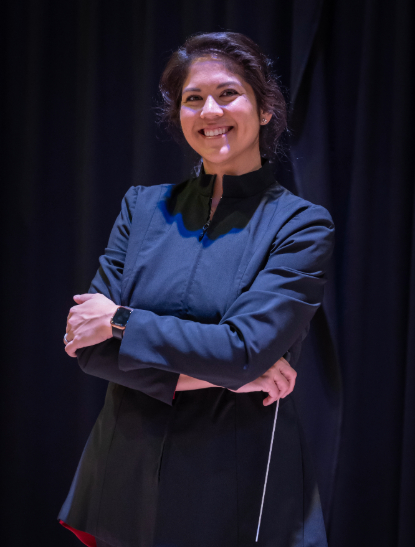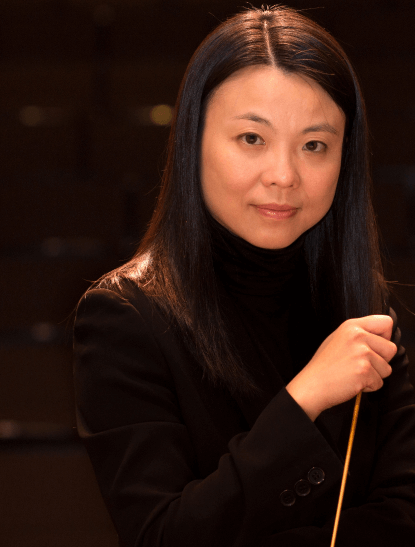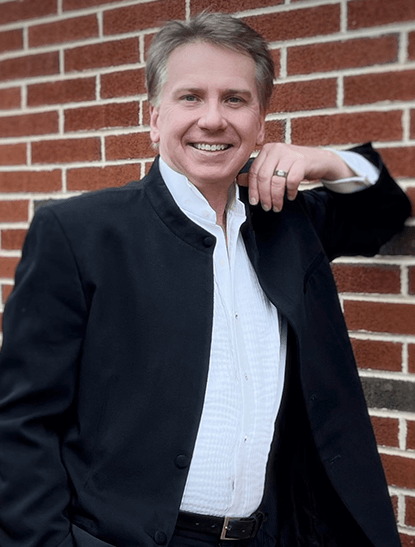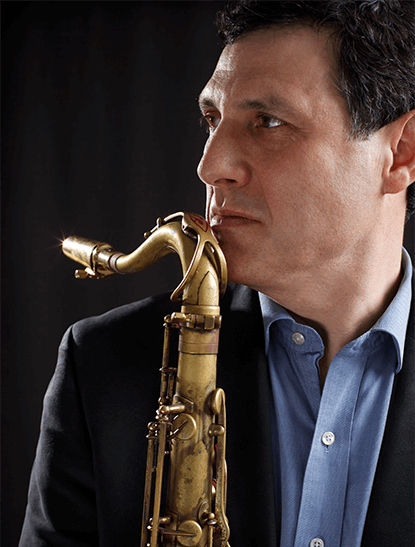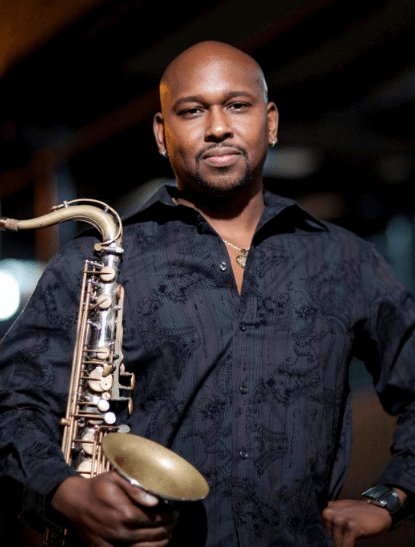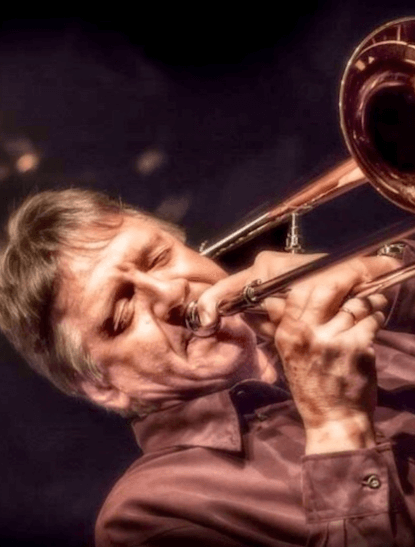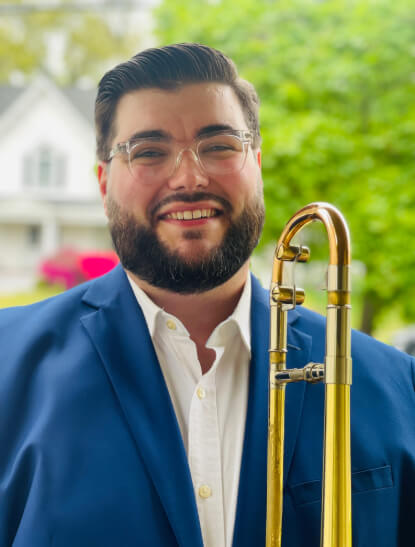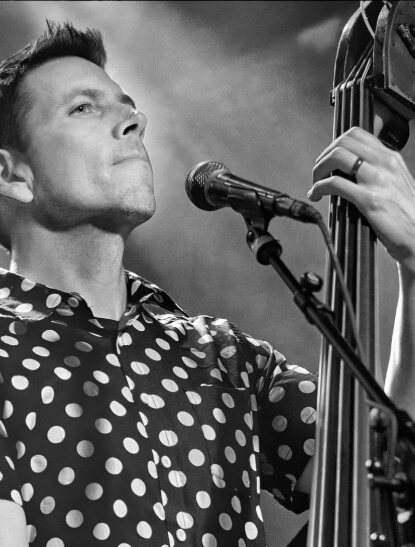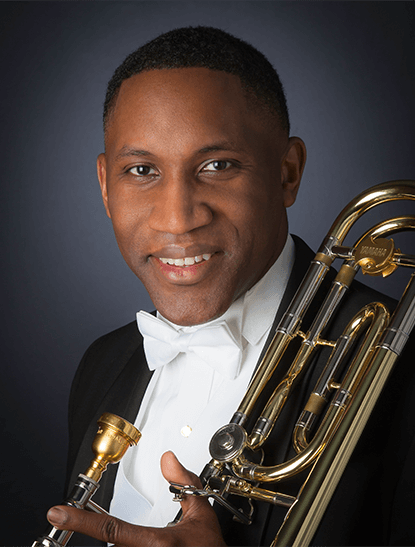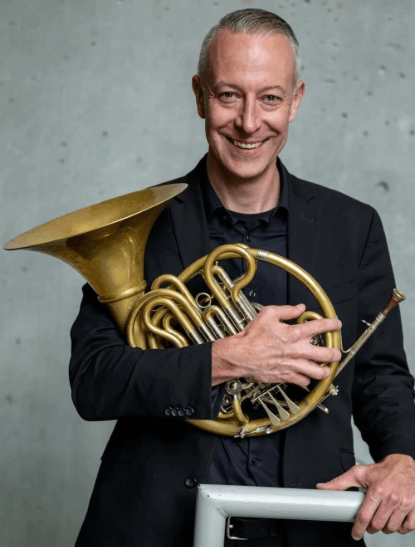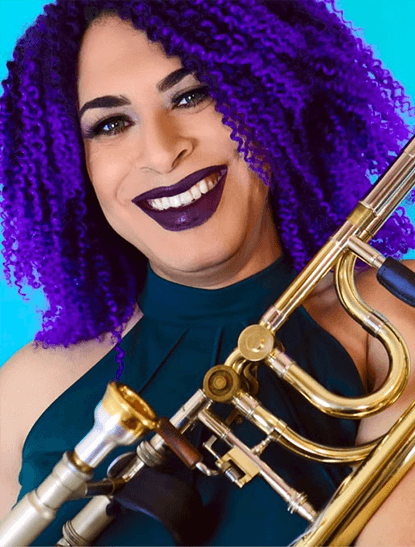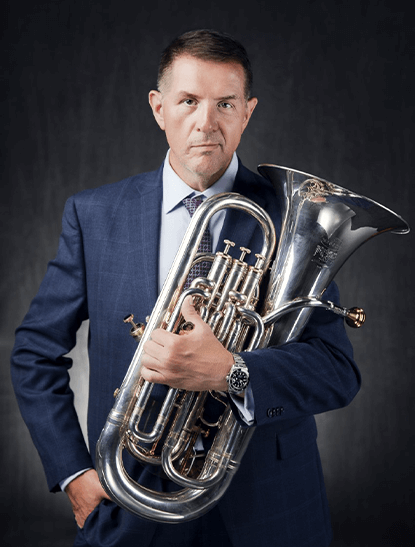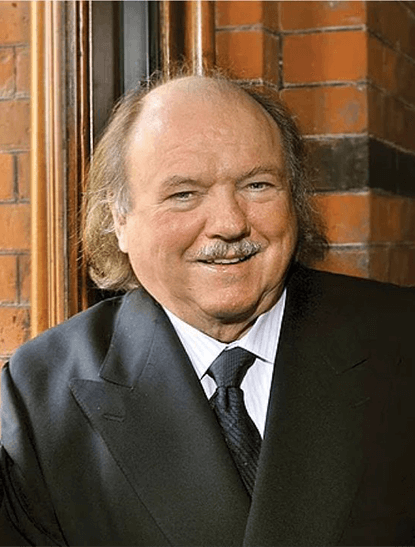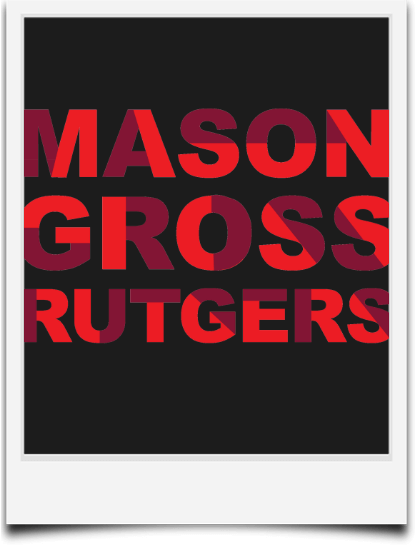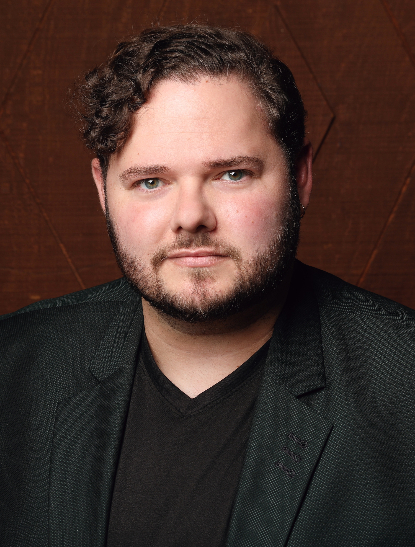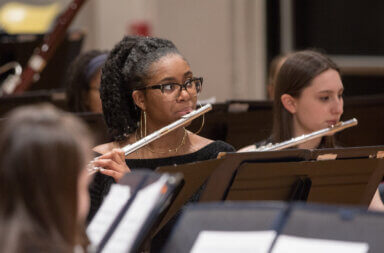The Music Department offers a comprehensive music program within the context of a public research university. Our programs benefit from the university’s proximity to major centers of performance and numerous other universities and conservatories. The department regularly brings guest artists and lecturers to campus to offer master classes, workshops, and presentations to meet the needs of students in each of our degree programs.
At the graduate level, students in prepare for careers at the highest professional levels. Academic courses include both scholars and practitioners, giving students a truly interdisciplinary perspective. Our graduate students have gone on to careers in orchestras and to academic positions at renowned universities and conservatories around the world.
Mason Gross School of the Arts offers graduate programs for master of music (MM), doctor of musical arts (DMA), and artist diploma (AD) in the following programs:
- MM and DMA in conducting
- MM in jazz studies
- MM and DMA in music education
- MM, DMA, and AD in performance
- AD, MM in opera
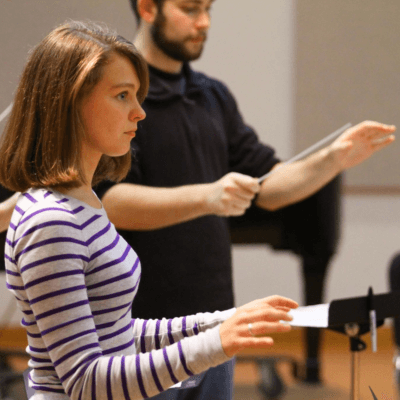
Conducting Programs
The Mason Gross conducting program offers master’s and doctoral degrees in choral, orchestral, and instrumental/wind conducting, providing a rich curriculum of courses spanning performance practice, private instruction, practical research, and hands-on training. Classes are small, and students receive ample podium time. The conducting program supplies students with a firm foundation for a career in music, whether the goal is to perform, teach, or prepare for further study.
The Music Department at Rutgers offers the following conducting degrees:
- Master of music in choral conducting
- Master of music in wind band conducting
- Master of music in orchestral conducting
- Doctor of musical arts in choral conducting
- Doctor of musical arts in wind band conducting
- Doctor of musical arts in orchestral conducting
Learning Goals of the DMA and MM Degrees in Conducting
What students will know:
Upon completion of the DMA or MM degrees in Conducting, students will have gained mastery in their major area of study, honing their skills in solo performance, small ensemble, and large ensemble settings. Students will have established strong knowledge and research skills in the academic study of music, including western music history and music theory as well as music in diverse cultural contexts. They will have prepared to become professionals in the field of conducting.
What students will do:
Upon completion of the DMA or MM degrees in Conducting, students will have learned to employ critical thinking and creative skills to contribute to the field of conducting and the broader musical and artistic environment in which they live.
What students will value:
Upon completion of the DMA or MM degrees in Conducting, students will have learned to value the historical and contemporary role of the arts in society. They will value a wide range of musical traditions and artists representing diverse backgrounds in culture, race, ethnicity, religious beliefs, disability, gender and gender expression, and sexual orientation.
Career Outcomes
This degree program could lead to careers such as:
- Performer/freelance musician
- Member of a professional ensemble
- Private lesson instructor
- Teacher at an independent music school
- Arts or nonprofit administration
It could also lead to continuing education in a more advanced graduate program.
Students receive a weekly 60-minute lesson with their major performance teacher for 12 weeks of the semester. Participation in ensembles through rehearsal, performance, and development of administrative skills necessary for the profession is an essential aspect of the program. Students supplement their professional-level training in performance with courses in musicology, music theory, and music literature.
Assistant Professor, Music Education and Conducting
Community Arts
Community Arts
Choral Conducting
In addition to presenting a broad repertory in significant venues, the choral program hosts a vibrant and progressive graduate choral conducting program. Masters and doctoral students regularly present concerts with professional musicians and nationally recognized soloists. In 2019, the choral area debuted Passaggio, Rutgers University’s fully funded professional chorus that choral graduate students conduct for their recitals. Graduates of the DMA program in choral conducting hold or held full-time positions at the University of Arkansas, University of Illinois, Calvin University (MI), Kennesaw State University (GA), Kutztown University (PA), Mount Holyoke (MA), Northwestern University (IL), Seton Hill University (PA), Seton Hall University (NJ), SUNY New Paltz, Wagner College (NJ), Westminster Choir College (NJ), and William Paterson University (NJ).
Mason Gross School of the Arts offers the following performance degrees:
• Master of music degree in performance
• Master of music degree in opera
• Doctor of musical arts degree in performance
• Artist diploma in performance
• Artist diploma in opera
Wind Band Conducting
The graduate program (MM and DMA) in wind band conducting offers comprehensive training for aspiring conductors in preparation for future professional goals. Through the course of study, students will develop advanced skills including score study, conducting techniques, efficient and effective rehearsal techniques, significant knowledge of wind band literature and composers, and a deep understanding of styles and performance practices from diverse genres. Graduate wind band conducting students receive a gracious amount of podium time working with Rutgers University Bands and other assignments in various instrumental settings. Located in the tri-state area, Mason Gross provides potential collaborative and additional performance opportunities in the community and beyond. The vibrant settings of the program and the rich musical culture in the New York City and Philadelphia metropolitan areas ideally and practically provide avenues for professional development.
Orchestral Conducting
The graduate program (MM and DMA) in orchestral conducting offers comprehensive training for aspiring orchestra conductors and aims to help young conductors to launch conducting careers. Through the course of study, students are expected to develop and master the essential skills such as score study, advanced conducting techniques, efficient and effective rehearsal techniques, styles and performance practices, and significant knowledge of orchestral literature in diverse genres. Graduate conducting students receive ample podium time through working with Rutgers orchestras and other assignments in various settings. Located in the tri-state area, Mason Gross provides potential collaborative and additional performance opportunities in the community and beyond. The vibrant settings of the program and the rich musical culture in the New York City and Philadelphia metropolitan areas ideally and practically provide avenues for professional development.
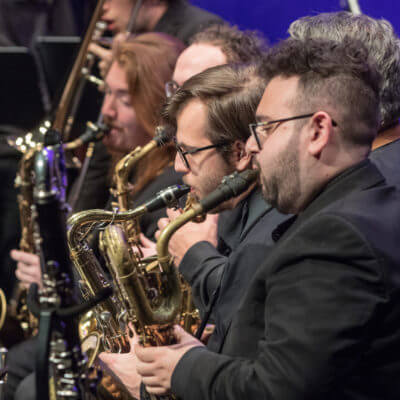
Jazz Studies Programs
The Rutgers University jazz program is located less than an hour’s ride from New York City and Philadelphia. The proximity to the New York City jazz scene offers many advantages, including an all-star faculty, and performance opportunities at important New York City venues. The graduate program in jazz studies includes a comprehensive curriculum of jazz improvisation, composition and arranging, jazz historiography, and private lessons with some of the world’s best jazz musicians and educators.
Mason Gross School of the Arts offers the following Jazz Studies program:
- Master of music in jazz studies
Learning Goals of the MM Degree in Jazz Studies
What students will know:
Upon completion of the MM degree in Jazz Studies, students will have gained mastery in their major area of study, honing their skills in solo performance, small ensemble, and large ensemble settings. Students will have established strong knowledge and research skills in the academic study of music, including western music history and music theory as well as music in diverse cultural contexts. They will have prepared to become professionals in the field of jazz.
What students will do:
Upon completion of the MM degree in Jazz Studies, students will have learned to employ critical thinking and creative skills to contribute to the field of jazz and the broader musical and artistic environment in which they live.
What students will value:
Upon completion of the MM degree in Jazz Studies, students will have learned to value the historical and contemporary role of the arts in society. They will value a wide range of musical traditions and artists representing diverse backgrounds in culture, race, ethnicity, religious beliefs, disability, gender and gender expression, and sexual orientation.
Career Outcomes
This degree program could lead to careers in:
- Freelance performance
- Contemporary Composition and Orchestration
- Private lesson instruction
- Performance and scoring for media
- Music Education and lecturing
This course of study will prepare you for a professional career in jazz and commercial music. Information about the curriculum can be found here.
Faculty
An all-star faculty has made up of some of the world’s best jazz musicians and educators, such as Ralph Bowen, Conrad Herwig, Victor Lewis, Vic Juris, Kenny Davis, Joe Mosello, Tatum Greenblatt, Eddie Palmieri, Fred Hersch, and Bill O’Connell.
Director, Rutgers Jazz Lab Big Band
Jazz Composition/Arranging
Jazz Historiography
Avant Garde Ensemble
Assistant Teaching Professor
Community Arts
Rutgers Jazz and Chamber Jazz ensembles perform at some of the most important venues such as the Blue Note Jazz Club and Symphony Space in New York CIty. Additionally, they have traveled internationally to Fukui, Japan, and have performed and recorded with Benny Carter (State Theatre, New Brunswick/Music Masters Records) and Ray Charles (Trenton War Memorial Hall/PBS Television).
The Rutgers Jazz Ensemble, directed by Conrad Herwig, is the top student jazz ensemble at the Mason Gross School of the Arts. A recent concert series included a tribute to Charles Mingus, featuring Ku-umba Frank Lacy and a performance at the Blue Note, the eighth consecutive year the ensemble has performed at this prestigious venue. Other concert series featured Michael Phillip Mossman and Joe Chambers. Previous guest artists and clinicians have included Eddie Palmieri, Wynton Marsalis, Frank Sinatra Jr. Jon Faddis, Terell Stafford, Mulgrew Miller, Edward Simon, Benny Golson, Gerald Wilson, Slide Hampton, Tom Harrell, Paquito D’Rivera, among others.
View a full list of our jazz ensembles.
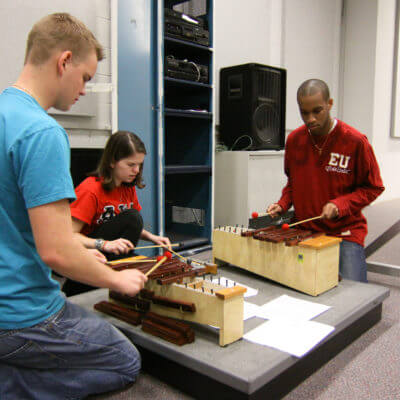
Music Education Programs
Graduate students may pursue master’s and doctoral degrees in music education at Mason Gross. Both degrees offer courses in a flexible format designed to meet the needs of practicing music teachers.
Learning Goals of the MM degree in Music Education
What students will know:
Upon completion of the MM degree in Music Education, students will have built upon their undergraduate learning and their practical experience to deepen and diversify their knowledge of current curricular, pedagogical, and professional knowledge in music education and general education. As practicing music educators, they will learn about critical, timely, and historical issues that shape 21st century music education, and how to use research to answer questions about practice. They will learn how to work as reflective practitioners and teacher-researchers to improve their teaching practice and their students’ success. They will have supplemented their existing musical knowledge with content in areas such as history, theory, composition, music literature, ethnomusicology, and music technology.
What students will do:
Upon completion of the MM degree in Music Education, students will have learned to employ their advanced knowledge in music education, as well as critical thinking and creative skills, to stretch their philosophical beliefs, improve their practice through research and reflection, innovate within their classroom and their school, and serve their school communities as leaders. They will rely on research-based evidence and other scholarly sources when seeking solutions to problems of practice. They will apply their new knowledge and skills to contribute to the broader musical and artistic environment in which they live. They will strive to create music learning environments that cultivate critical and creative thinking and meet the individual learning and identity needs of all students.
What students will value:
Upon completion of the MM degree with in Music Education, students will have learned to value the historical and contemporary role of the arts in education and in society. They will value the diverse backgrounds and learning styles of the students they teach and the importance of helping all students succeed through individualization and differentiation. They will value a wide range of musical traditions and artists representing diverse backgrounds in culture, race, ethnicity, religious beliefs, disability, gender and gender expression, and sexual orientation, and the importance of incorporating this diversity into their teaching practice. They will value that music learning can and should take many diverse forms suited to the students, school, and community in which they work. They will value the importance of reflection and research to improve practice and innovate within the classroom. They will value the importance of serving as a leader within their school community.
Requirements
Career Outcomes
The MM in Music with a Concentration in Music Education is designed to address the professional growth of music teachers who already hold teaching certification (from any state or country) and are currently teaching in K-12 school settings. The MM in Music with a Concentration in Music Education does NOT lead to teacher certification.
The degree program could lead to career outcomes such as:
- Continuing in teaching positions with renewed energy and perspective
- Successfully achieving a new or different teaching position
- Pursuing school or district leadership opportunities
- Working in educational contexts outside of schools
- Pursuing continuing education at the doctoral level
Learning Goals of the DMA Degree in Music Education
What students will know:
Upon completion of the DMA degree in Music Education, students will have attained marked ability as music education scholars and researchers, broadened their knowledge of current music education research and practice, and supplemented their existing musical knowledge with content in areas such as history, theory, composition, music literature, ethnomusicology, and music technology. As practicing music educators, they will learn about critical, timely, and historical issues that shape 21st century music education, and how to design research studies that contribute to the field. Pursuit of an area of specialization (cognate) will enable each student to individualize their study to deepen knowledge and skills that support their research or professional goals.
What students will do:
Upon completion of the DMA degree in Music Education, students will have conducted original music education research and made a significant contribution to the field by writing an extended dissertation. They will participate in the scholarly discourse in music education through conference presentations and publications. They will rely on research-based evidence and practioner-inquiry when seeking to innovate or solve problems within their teaching practice. They will contribute to the growth of the field by supporting and guiding the next generation of music educators through service as cooperating teachers, in-service peer mentors, student teaching supervisors, or university instructors. They will strive to mentor beginning music educators from underrepresented populations to professional success.
What students will value:
Upon completion of the DMA degree in Music Education, students will have learned to value the historical and contemporary role of the arts in education and in society. They will value the importance of research-informed decision-making within the classroom and the importance of cultivating the next generation of diverse music educators. They will value the diverse backgrounds and learning styles of the students they teach and the importance of helping all students succeed through individualization and differentiation. They will value a wide range of musical traditions and artists representing diverse backgrounds in culture, race, ethnicity, religious beliefs, disability, gender and gender expression, and sexual orientation, and the importance of incorporating this diversity into their teaching practice. They will value that music learning can and should take many diverse forms suited to the students, school, and community in which they work. They will value the importance of serving as a leader within the field of music education.
Requirements
Career Outcomes
The degree program could lead to career outcomes such as:
- K-12 School or District Department Chair or Director
- Music or Arts District-Level Supervisor
- School Principal
- University-Level Instructor
- Scholar or Researcher in Music Education
The master in music education is designed to address the professional growth of music teachers who already hold teaching certification (from any state or country) and are currently teaching in K-12 school settings. Students in the MM program are challenged to consider critical and timely issues in music education, stretch their philosophical beliefs, deepen their understanding of music education curriculum and pedagogy, develop skills as reflective practitioners, innovate within their existing practice, and commit to serving their school communities as leaders within the profession.
The degree is designed with hybrid flexibility and includes a pathway to graduation in two years and one summer (6 credits each semester) while working as a full-time teacher. It is possible to complete the MM degree entirely online through synchronous (evening Eastern time) and asynchronous courses. The degree requires 30 credits of study, and includes three core courses in music education, flexible music education-focused electives, and an individualized capstone project designed to meet each student’s professional or academic goals. No audition is required.
The doctor of musical arts in music education is a research degree designed for professional music educators who wish to pursue advanced scholarly inquiry while expanding their perspectives on music education. Doctoral students in music education broaden their knowledge of current music education research and practice, either to advance in their teaching/supervisory positions or to prepare for a career in higher education.
The degree requires a minimum of 57 semester hours of graduate course work beyond the master’s degree. Courses are offered by the Music Department and the Graduate School of Education and include advanced studies in research, music education, curriculum and pedagogy, music theory, and music history. Students complete 12 credits in a cognate area of their choice such as: educational administration, teaching with technology, special education, conducting, musicology, composition, performance, or another topic. All cognates require music education faculty approval, and some require auditions. After successfully passing comprehensive examinations, a student’s study culminates in 12 credits of dissertation research leading to a dissertation on a topic related to music education. Dissertations may be historical, philosophical, empirical, or curricular in nature. There is no foreign language requirement.
It is expected that the degree requirements for this program will be completed in five years of continuous enrollment; a maximum of seven years is allowed. Students are not required to maintain a full-time residency but must enroll in at least one 3-credit course each semester prior to dissertation research.
Assistant Professor, Music Education and Conducting
Community Arts
Head of Music Education
Associate Professor
Music
Assistant Professor, Music Education
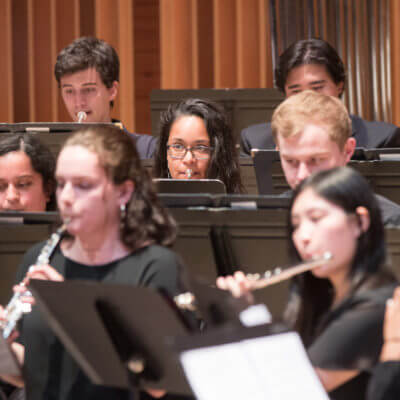
Performance Programs
The graduate program is designed for students who have fully committed to a life in music and are focused on honing their craft before embarking on a professional career. In addition to private study, students can choose from a variety of specialized courses in music history and music theory. DMA students are also trained to pursue the highest level of academic scholarship in addition to musical excellence. There are also numerous opportunities to work on campus, including as a faculty member at Rutgers Community Arts and as a staff accompanist.
In the MM and DMA degree programs, students supplement their professional-level training in performance with courses in musicology, music theory, and music literature. The AD program is more narrowly focused on professional-level training in performance.
Mason Gross School of the Arts offers the following performance degrees:
- Master of music degree in performance
- Master of music degree in opera
- Doctor of musical arts degree in performance
- Artist diploma in performance
- Artist diploma in opera
Learning Goals of the MM Degree in Performance
What students will know:
Upon completion of the MM degree in performance, students will have gained mastery in their major area of study, honing their skills in solo performance, small ensemble, and large ensemble settings. Students will have established strong knowledge and research skills in the academic study of music, including western music history and music theory as well as music in diverse cultural contexts. They will have prepared to become professionals in the field of performance.
What students will do:
Upon completion of the MM degree in performance, students will have learned to employ critical thinking and creative skills to contribute to the field of performance and the broader musical and artistic environment in which they live.
What students will value:
Upon completion of the MM degree in performance, students will have learned to value the historical and contemporary role of the arts in society. They will value a wide range of musical traditions and artists representing diverse backgrounds in culture, race, ethnicity, religious beliefs, disability, gender and gender expression, and sexual orientation.
Requirements
Career Outcomes
This degree program could lead to careers such as:
- Performer/freelance musician
- Member of a professional ensemble
- Private lesson instructor
- Teacher at an independent music school
- Arts or nonprofit administration
It could also lead to continuing education in a more advanced graduate program.
Learning Goals of the MM Degree in Opera
What students will know:
Upon completion of the MM or AD degree in opera, students will have gained mastery in their major area of study, honing their skills in solo performance, small ensemble, and large ensemble settings. Students will have established strong knowledge and research skills in the academic study of music, including western music history and music theory as well as music in diverse cultural contexts. They will have prepared to become professionals in the field of opera.
What students will do:
Upon completion of the MM or AD degree in opera, students will have learned to employ critical thinking and creative skills to contribute to the field of opera and the broader musical and artistic environment in which they live.
What students will value:
Upon completion of the MM or AD degree in opera, students will have learned to value the historical and contemporary role of the arts in society. They will value a wide range of musical traditions and artists representing diverse backgrounds in culture, race, ethnicity, religious beliefs, disability, gender and gender expression, and sexual orientation.
Requirements
Career Outcomes
This degree program could lead to careers such as:
- Performer/freelance musician
- Member of a professional ensemble
- Private lesson instructor
- Teacher at an independent music school
- Arts or nonprofit administration
It could also lead to continuing education in a more advanced graduate program.
Learning Goals of the DMA Degree in Instrumental Performance
What students will know:
Upon completion of the DMA degree in Instrumental Performance, students will have gained marked ability in their major area of study, refining their skills in solo performance, small ensemble, and large ensemble settings. Students will have established highly advanced knowledge and research skills in the academic study of music, including western music history and music theory as well as music in diverse cultural contexts. They will have prepared to become authoritative professionals in the field of instrumental performance.
What students will do:
Upon completion of the DMA degree in Instrumental Performance, students will have learned to employ advanced critical thinking, research, and creative skills to contribute to the field of instrumental performance and the broader musical and artistic environment in which they live.
What students will value:
Upon completion of the DMA degree in Instrumental Performance, students will have learned to value the historical and contemporary role of the arts in society. They will value a wide range of musical traditions and artists representing diverse backgrounds in culture, race, ethnicity, religious beliefs, disability, gender and gender expression, and sexual orientation.
Requirements
Career Outcomes
This degree program could lead to careers such as:
- Performer/freelance musician
- Member of a professional ensemble
- Private lesson instructor
- Teacher at an independent music school
- Arts or nonprofit administration
Learning Goals of the DMA Degree in Vocal Performance
What students will know
Upon completion of the DMA degree in Vocal Performance, students will have gained marked ability in their major area of study, refining their skills in in the fields of opera, oratorio, and art song.
What students will do
Upon completion of the DMA degree in Vocal Performance, students will have learned to employ advanced critical thinking, research, and creative skills to contribute to the field of vocal performance and the broader musical and artistic environment in which they live.
What students will value
Upon completion of the DMA degree in Vocal Performance, students will have learned to value the historical and contemporary role of the arts in society. They will value a wide range of musical traditions and artists representing diverse backgrounds in culture, race, ethnicity, religious beliefs, disability, gender and gender expression, and sexual orientation.
Requirements
Career Outcomes
This degree program could lead to careers such as:
- Performer/freelance musician
- Member of a professional ensemble
- Private lesson instructor
- Teacher at an independent music school
- Arts or nonprofit administration
Learning Goals of the DMA Degree in Piano
What students will know:
Upon completion of the DMA degree in Piano, students will have gained marked ability in their major area of study, refining their skills in solo performance, small ensemble, and large ensemble settings. Students will have established highly advanced knowledge and research skills in the academic study of music, including western music history and music theory as well as music in diverse cultural contexts. They will have prepared to become authoritative professionals in the field of piano.
What students will do:
Upon completion of the DMA degree in Piano, students will have learned to employ advanced critical thinking, research, and creative skills to contribute to the field of piano and the broader musical and artistic environment in which they live.
What students will value:
Upon completion of the DMA degree in Piano, students will have learned to value the historical and contemporary role of the arts in society. They will value a wide range of musical traditions and artists representing diverse backgrounds in culture, race, ethnicity, religious beliefs, disability, gender and gender expression, and sexual orientation.
Requirements
Career Outcomes
This degree program could lead to careers such as:
- Performer/freelance musician
- Member of a professional ensemble
- Private lesson instructor
- Teacher at an independent music school
- Arts or nonprofit administration
Learning Goals of the Artist Diploma
What students will know:
Upon completion of the Artist Diploma, students will have gained marked ability in their major area of study, refining their skills in solo performance, small ensemble, and large ensemble settings. They will have prepared to become authoritative professionals in their field.
What students will do:
Upon completion of the Artist Diploma, students will have learned to employ critical thinking and creative skills to contribute to their field of and the broader musical and artistic environment in which they live.
What students will value:
Upon completion of the Artist Diploma, students will have learned to value the historical and contemporary role of the arts in society. They will value a wide range of musical traditions and artists representing diverse backgrounds in culture, race, ethnicity, religious beliefs, disability, gender and gender expression, and sexual orientation.
Requirements
Career Outcomes
This degree program could lead to careers such as:
- Performer/freelance musician
- Member of a professional ensemble
- Private lesson instructor
- Teacher at an independent music school
- Arts or nonprofit administration
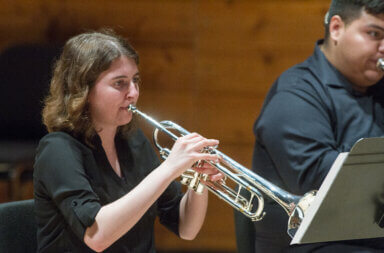
The Mason Gross brass program is designed to provide the highest level of training for young artists and to help them develop the skills needed for a variety of careers in music. The unique nature of Mason Gross enables students to have the advantages of a professionally oriented conservatory program and benefit from the many resources of a large university. Each student receives personalized attention in a supportive community.
Instruments
Euphonium
Horn
Trombone (tenor and bass)
Trumpet
Tuba
Faculty
Students work closely with members of our distinguished faculty, which includes members of the New York Philharmonic, Metropolitan Opera Orchestra, New York City and American Ballet Theater Orchestras, American Symphony and other ensembles in New York City and beyond.

The Mason Gross keyboard program is designed to provide the highest level of training to young artists and to help them develop the skills needed for a variety of careers in music. The undergraduate curriculum centers on individual private lessons, a rigorous music theory and ear training sequence, as well as a variety of courses in music history and ethnomusicology. Study is further supplemented by chamber music, pedagogy, accompanying classes, and a large offering of liberal arts courses.
Instruments
Piano
Faculty

The Mason Gross percussion program prepares students for a broad range of career paths. Building on an orchestral core, including timpani and percussion training, the program encourages students to explore Afro-Cuban traditions, as well as contemporary performance practice in chamber music and solo settings.
The Rutgers Percussion Ensemble, hailed by The New York Times for one of “10 Best Performances of 2017,” performs both on and off campus throughout the year and has been featured at the Percussive Arts Society International Convention in Indianapolis.
The curriculum of the percussion program focuses on development of the orchestral core and allows students to customize their training to address their specific interests in the field. Recent graduates hold orchestral positions, chairs on Broadway shows, and teach around the world.
Faculty
The faculty members in the percussion program “team teach,” meaning that each student receives instruction with all faculty members in both private lessons and masterclasses. The faculty work professionally in all areas of the field—orchestral, Broadway, chamber music, and solo performance. They perform regularly with the Cleveland Orchestra, the New York Philharmonic, the Metropolitan Opera Orchestra, on Broadway, and with new music ensembles throughout the New York area.
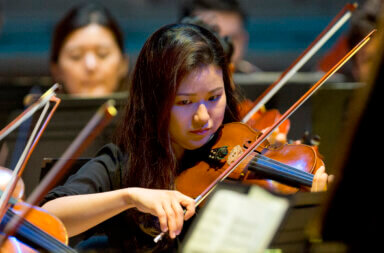
The Mason Gross strings program is designed to provide the highest level of training to young artists and to help them develop the skills needed for a variety of careers in music. Students work closely with members of our distinguished faculty to refine their craft and develop as musicians. The small size of our program helps to ensure a personalized education for each student as well as a communal atmosphere. Study is supplemented by chamber music, orchestral performance, String Ensemble, pedagogy, and an extensive offering of liberal arts courses. The unique nature of Mason Gross enables students to benefit from the advantages of a professionally oriented conservatory program as well as the many advantages of a large university.
Instruments
Cello
Double Bass
Harp
Viola
Violin
Faculty
Community Arts
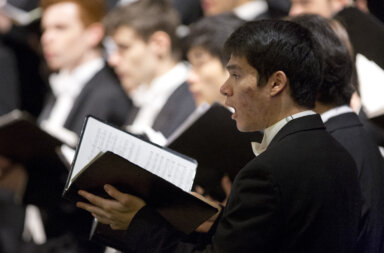
The voice program aims to foster a genuine understanding of efficient, healthy vocalism that features free vocal production with beauty of tone, optimum resonance, and the ability to effectively communicate thoughts and passion through the delivery of word and music on the concert and operatic stages. Students are trained to become disciplined, compelling artists who are performers of vocal repertoire from all genres with a secure knowledge of musical aesthetics, style, performance practice, and accurate diction. Students may participate in any of the several choral ensembles offered including Rutgers Kirkpatrick Choir, Rutgers Glee Club, Rutgers Voorhees Choir, and Rutgers University Choir.
Faculty
The members of the voice faculty include pedagogues who are also distinguished artists with careers that feature numerous productions at the Metropolitan Opera, Covent Garden, Vienna State Opera, La Scala, Carnegie Hall, Lincoln Center, the Musikverein in Vienna; and many other major national and international venues.
The Mason Gross woodwind program is designed to provide the highest level of training for young artists and to help them develop the skills needed for a variety of careers in music. Students work individually with members of our distinguished faculty to develop as musicians. The unique nature of Mason Gross enables students to have the advantages of a both a professionally oriented conservatory program with personalized attention in a supportive community as well as the benefits of the many resources of a large university. Studies will also include pedagogy and an extensive offering of liberal arts courses.
Instruments
Bassoon
Clarinet
Flute
Oboe
Saxophone
Faculty
Our woodwind faculty members appear in the New York and Philadelphia arts communities as members of the New York Philharmonic, New Jersey Symphony Orchestra, Imani Winds, and as freelancers in these and many other ensembles and concerts.
Head of Woodwinds
Associate Professor, Clarinet
Community Arts

